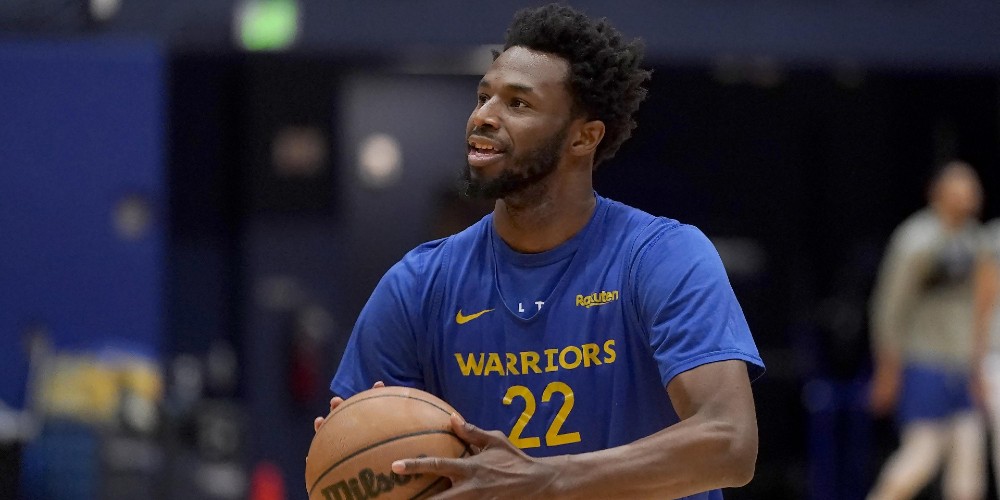Andrew Wiggins has had quite a year.
The 27-year old NBA star won a championship with the Golden State Warriors, was selected to his first All-Star game, and is looking to ink a contract extension that could pay him $180 million over the next five years.
But when Wiggins was interviewed by reporters on Tuesday, he said there was one thing that is still bothering him.
“I still wish I didn’t get [vaccinated], to be honest with you,” Wiggins told FanSided when asked about his decision. “But you gotta do what you gotta do.”
Wiggins, like Brooklyn Nets guard Kyrie Irving, had reservations about getting vaccinated against COVID-19. But unlike Irving, who missed much of the regular season because he declined to get vaccinated, Wiggins opted to acquiesce and get the shot.
“I did it, and I was an All-Star this year and champion, so that was the good part, just not missing out on the year, the best year of my career,” Wiggins said.
As for the bad part, Wiggins doesn’t mention any adverse reaction from the vaccine. His primary beef appears to be that he was essentially forced to receive an injection of something he didn’t quite trust.
“I just don’t like putting all that stuff in my body, so I didn’t like that,” Wiggins said, “and I didn’t like that it wasn’t my choice. I didn’t like that it was either get this or don’t play.”
‘An Act Must Be Free’
Economists often talk about the importance of individual choice from a market perspective.
Every day, humans make thousands of decisions—big and small, consciously and subconsciously—that affect their lives and the world around them. Rational choice theory suggests that individuals “tend to make rational choices and achieve outcomes that are aligned with their own personal objectives,” which tends to lead to individual and collective prosperity and harmony. This is why the global rise of capitalism, which relies on consent and individual choice, unleashed unprecedented human prosperity in the 19th century that continues to this day.
But choice also matters a great deal from a moral perspective, and this idea tends to receive much less attention.
The economist Ludwig von Mises once observed that “exhortations and admonishments of morality” are useless unless people are freely allowed to choose.
“It is useless to tell a bondsman what is morally good and what is morally bad. He is not free to determine his comportment; he is forced to obey the orders of his master,” Mises wrote. “This is why freedom is not only a political postulate, but no less a postulate of every religious or secular morality.”
The economist Murray Rothbard was even more concise.
“To be moral, an act must be free,” Rothbard said.
Rothbard drew inspiration from philosopher Frank Meyer, who noted that the ability to choose—whether the choice be good or ill—is what distinguishes man from beast.
“[Man] must be free to choose his worst as well as his best end,” Meyer wrote in Defense of Freedom. “Unless he can choose his worst, he cannot choose his best.”
When Andrew Wiggins says, “I didn’t like that it wasn’t my choice,” I suspect this is what he was referring to. As Meyer says, having a choice is what separates humans from beasts, which is why it chafes when we’re deprived of it.
Some may quibble and say that Wiggins did have a choice: Get vaccinated or don’t play basketball. They’d be right, but that is a choice he never should have had to make.
The great American thinker Henry David Thoreau, who once went to jail for refusing to pay a poll tax, likely would have sympathized with Wiggins’s dismay at being coerced to get vaccinated, whether the pressure came from a government body or an employer.
“I was not born to be forced,” the Civil Disobedience author noted. “I will breathe after my own fashion.”

Jon Miltimore
Jonathan Miltimore is the Managing Editor of FEE.org. His writing/reporting has been the subject of articles in TIME magazine, The Wall Street Journal, CNN, Forbes, Fox News, and the Star Tribune.
Bylines: Newsweek, The Washington Times, MSN.com, The Washington Examiner, The Daily Caller, The Federalist, the Epoch Times.
This article was originally published on FEE.org. Read the original article.
“Beef Steak” – our most popular survival beef product – is on sale now.
Promo code “steak40” at checkout for 40% off!



